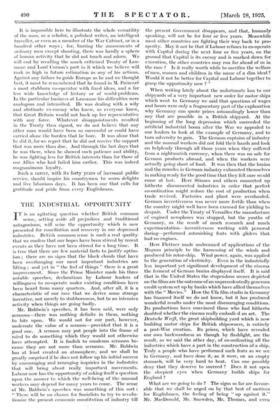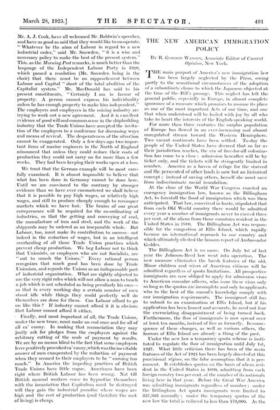THE INDUSTRIAL OPPORTUNITY
IT is an agitating question whether British common sense, setting aside all prejudices and traditional antagonisms, will seize the opportunity which is now presented for conciliation and recovery in our depressed industries. British common sense is such a real quality that we confess that our hopes have been stirred by recent events as they have not been stirred for a long time. It is true that there are few material facts to justify- optim- ism ; there are no signs that the black clouds that have been overhanging our most important industries are lifting ; and yet in " the feel of things " there is a great improvement. Since the Prime Minister made his three notable speeches, declarations by Labour leaders of willingness to co-operate under existing conditions have been heard from many quarters. And, after all, it is a characteristic of our race that we derive some strange incentive, not merely to stubbornness, but to an intensive activity- when things are going badly. .
- Mr. Baldwin's speeches, it has been said, were only sermons—there was nothing definite in them, nothing to bite upon. We would not for our part, however, underrate the value of a sermon—provided that it is a good one. A sermon may put people into the frame of mind to do something which they would -not otherwise have attempted. It is foolish to condemn sermons be- cause they are not more than- sermons.- Mr. Baldwin has at least created an atmosphere,' and we shall be greatly surprised if he does not follow up his initial success by 'encouraging and arranging inquiries in the industries that will - bring about really important movements. Labour now has the- opportunity of asking itself a question upon the answer to which the well-being of the manual workers may depend for many years to come. The sense of Mr. Baldwin's speeches • was something- of this sort : There will be no -chance for Socialists to try to revolu- tionize the present economic constitution of industry till the present Government disappears, and that, humanly speaking, will not be for four or five years. Meanwhile most other countries are fighting their way back to pro- sperity. May it not be that if Labour refuses to co-operate with Capital during the next four or five years, on the ground that Capital is its enemy and is marked down for execution, the other countries may run far ahead of us in the race ? Is it really worth while to sacrifice the welfare of men, women and children in -the name of a dim ideal ? Would it not be better for Capital and Labour together to grasp the opportunity now ? " • When writing lately about the unfortunate loss to our shipyards of a very important new order for motor ships which went to Germany we said that questions of wages and hours were only a fragmentary part of the explanation why Germany can quote prices astoundingly lower than any that are possible in a British shipyard. At the beginning of the long depression which succeeded the- artificial industrial boom after 'the War we appealed to our leaders to look at the example of Germany, and to turn adversity to gain. The German captains of industry and the manual workers 'did not fold their hands and look on helplessly through all those years when. they suffered from a nightmarish currency, when there was no sale for German products abroad, and when the workers were actually going short of food. It was then that the brains andthe muscles in.German industry exhausted themselves in making ready for the good time that they felt sure would come at last. Herr Stinnes and others connected up hitherto disconnected industries in order that perfect co-ordination might reduce the cost of production when trade revived. Factories and plant were overhauled. German inventiveness was never more fertile than when the country might well have been excused for yielding to despair. Under the Treaty of Versailles the manufacture of engined aeroplanes was stopped, but the youths of Germany, as the result of much research and . much experimentation—.-inventiveness working with personal daring—performed astonishing feats with .gliders that had no engines.
Herr Flettner made undreamed of applications of the Magnus principle to the harnessing of the winds and produced his rotor-ship. Wind power, again, was applied to the generation of electricity. Even in the industrially less important yet significant development of the cinema the ferment of German brains displayed itself. It is said that in the United States the stupendous scenes depicted on the films are the outcome of an unprecedentedly.generous credit system set- up by banks which have allied themselves with the" Movies." How the Ufa film studio in Germany has fmanced itself we do not know, but it has produced wonderful results under the most discouraging conditions. Its productions have convinced those who had hitherto doubted whether the cinema really embodif d an art. The Deutsche Werft, the great shipbuilding yard which is now - building motor ships for British shipowners, is entirely a post-War creation. Its prices, which have revealed our own backwardness as though by . flashlight, are the result, as we said the other day; of co-ordinating all the. industries which have_a part in the. construction of a ship.. Truly a people who have performed such .feats as we see. in Germany, and have done iti.as it- were,. on an empty stomach, will be very .hard to -beat:: Can .one-: possibly deny that -they deserve to succeed ? Does it not open the sleepiest eyes when Germany builds ships for England ?
What are we going to do ? The signs so far are.favour- able that we: shall be _urged on by that best of motives for Englishmen, the feeling of being " up against. it." Mr. MacDonald, Mr. • Snowden,- Mr. Thomas, and even Mr. A. J. Cook, have all welcomed Mr. Baldwin's speeches, and have as good as said that they would like to co-operate. " Whatever be the aims of Labour in regard to a new industrial order," said Mr. Snowden, " it is a wise and necessary policy to make the best of the present system." This. as the Morning Post remarks, is much better than the language of the Independent Labour Party in 1920, which passed a resolution (Mr. Snowden being in the chair) that there must be no rapprochement between . Labour and Capital " short of the total- abolition of the Capitalist system." Mr. MacDonald has said to his present constituents, " Certainly I am in favour of property. A person cannot express his individuality unless he has enough property to make him independent." . The employers and employees in the milling industry are . trying to work out a new agreement. And it is excellent evidence of good will and common.sense in the shipbuilding • industry that the Trade Unions have accepted the invita- tion of the employers to a conference for discussing ways and means of revival. The desperateness of the situation cannot be exaggerated. Only a few days ago two impor- , tant firms of marine engineers in the North of England , announced that unless they could reduce their costs of production they could not carry on for more than a few weeks. They had been keeping their works open at a loss.
We trust that the German example will be most care- fully examined. It is almost impossible to believe that . what has been done in Germany cannot be done here. . Until we are convinced to the contrary by stronger evidence than we have ever encountered we shall believe . that it is possible to pay high wages, or relatively high wages, and still to produce cheaply enough to reconquer markets which we have lost. The brains of our great entrepreneurs will be required for the co-ordinating of industries, so that the getting and conveying of coal, the manufacture of iron and steel, and the work of the :shipyards may be ordered as an inseparable whole. But . Labour, too, must make its contribution to success—not indeed in the reduction of wages, but in an intelligent overhauling of all those Trade Union practices which . prevent cheap production. We beg Labour not to think . that Unionists, or employers who are not Socialists, are " out to smash the Unions." Every rational person recognizes that much good has been done by Trade _Unionism, and regards the Unions as an indispensable part • of industrial organization. . What are rightly objected to :arethe.very.rigid rules which will not allow a man to touch a job which is not scheduled as being peculiarly his own— so that in every working day- a certain number of men stand idle while things they could perfectly well do themselves are done for them. Can Labour afford to go on like this ? If industry cannot afford it it is obvious .that Labour cannot afford it either.
Finally, and most important of all, the Trade Unions, under the new truce, must make an end once and for all of -all ca'- canny. In making that renunciation they may -justly ask for pledgeS from the employers against the -arbitrary cutting of the scale of payment by results. -We are by no means blind to the fact that some employers have positively provoked ea' canny,which was the inevitable Answer of_men exasperated by the reduction of payment when they seemed to their employers to be " earning too much.". In America the impeding practices of British Trade Unions have little vogue. Americans have been right where British Labour has been wrong. Not till British manual workers cease to hypnotize themselves with the incantation that Capitalism must be destroyed will they gain the industrial paradise where wages arc -high and the cost of production (and therefore the cost of living) is cheap.















































 Previous page
Previous page